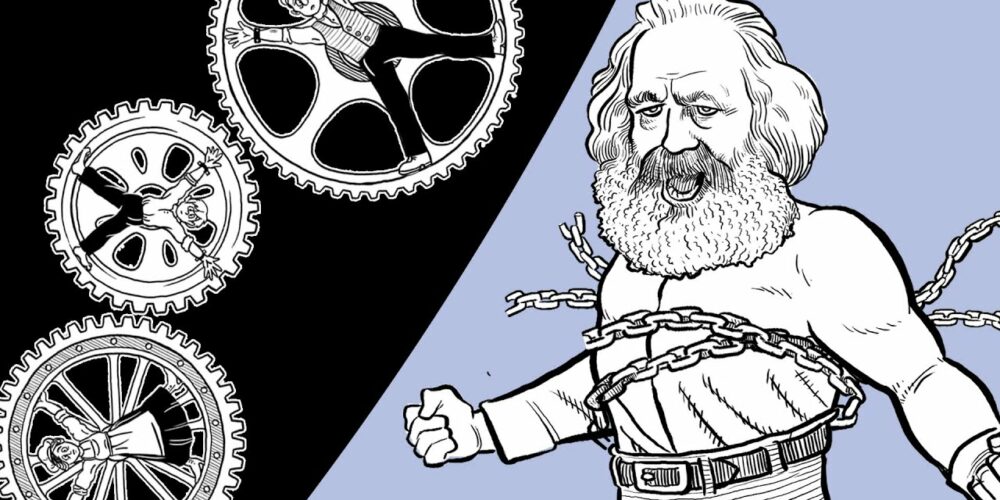Even our primate ancestors “worked”; they had “jobs”—not as we know them today but jobs nonetheless. And they “worked” to feed themselves and their offspring, just as we must do today. But of course they worked only to satisfy their needs: there was no working for someone, or being exploited.
Early human farming too was to survive; but then, with improving farming techniques, not only did humans begin to grow enough food for themselves but there was now a food surplus. The surplus food was sold or bartered. So began a momentous change for humans and their primitive societies.
This was one critical change from need to greed. It led to an evolution of hierarchies, class hierarchies, and ultimately jobs and employment but with it inequality and exploitation.
Today, work is presented as central to our lives, even normal. And for the majority it is; but that’s largely because of how those in power have organised societies to benefit themselves and the elite few (1 per cent) who benefit from the labours of others. Having a job has taken on a special status, particularly a class status. It has become competitive, hierarchical, and exploitative.
There is a cultural “social hierarchy” of those who work and those who don’t. The unemployed, the ill and those who live on welfare benefits are often portrayed in society as lazy and are seen as part of a lower sub-culture.
There are class and intra-class tensions, which of course employers and the wealthy exploit, to their advantage. However, the reality for everyone in the present system of living is that they need money to survive—an income, a wage.
Even to maintain a very basic standard of living, few people can afford to “bite the hand that feeds them,” or “rock the boat,” even when they know well that they are wage slaves and are under constant pressure to perform at work and never be ill or stressed.
But in modern society there are even more pressures. People are encouraged, even fooled, into the idea that we need to “better ourselves.” We are led to believe that we “need” newer, bigger houses (even two), new cars, new clothes, new electronic gadgets, two or three holidays a year, and so on. In other words, our consumerism must be endless, to drive the system of capitalism and neoliberalism that we live under.
Making this a “normal” part of life is the job of advertising and the media. And they have done an excellent job on us. They even coined the term “shopping therapy”—as if it was some new-found cure for all our ills. Fashion, style, sexiness, status—all these are used in overt and subliminal ways to play on our emotions. Your life will be better if you “buy” or have this “thing.”
But the ultimate result is to get you to spend, and therefore drive profits. The impression is carefully cultivated that we have the freedom and the power to spend as we please. We are “empowered,” they tell us. But all this has much deeper roots and consequences. Without doubt there are going to be “winners” and “losers” in this type of competitively created society, together with the resultant damage to mental and physical health.
To “keep pace” with “bettering ourselves” it’s going to be necessary for workers to compete ruthlessly in the job market to raise the finance to do this. But we are always confronted with the fact that the market that workers “sell their labour” in, and in which they are forced to be wage slaves, is stacked against them. They are at the mercy of this “wages market,” designed and controlled by the neoliberal system of competition, profit, exploitation, and ultimately inequality.
But what is this element of capitalism known as neoliberalism, and why does it affect our health, our society, our jobs, and what workers are paid? In his book Insane Medicine, Dr Sami Timimi wrote:
Neoliberalism refers to a way of organising our political and economic systems using a particular model of capitalism that promotes free market economics based around competition as the best way to organise and develop pretty much every aspect of society. It’s generally associated with policies of economic liberalisation that promote privatisation, deregulation, globalisation, free trade, austerity, and reductions in government spending in order to increase the role of the private sector across all sections of the economy.
Clearly, when (or if) you have a job you are in a “market,” and one way or another you have to “compete” for that job. If you don’t, there are lots of people who will. Again, this benefits the employer and the system that we live and work under, because businesses and employers too have to survive in this system: they will cut the work force, wages and corners to compete at their level. Small businesses compete against bigger businesses; bigger businesses compete against national businesses; and even nationally established businesses must compete against the transnational businesses and the globalised economy.
At every level it is the workers and jobs that sustain and are, in fact, the dynamos that drive these businesses. Without workers there are no businesses. However, it is the workers and jobs that suffer most, especially when the financial and business-development gurus decide that certain workers are costing too much and are deemed no longer “useful” to a business (read: more profit for the bosses).
Increasingly, workers find themselves powerless in the work-place. And this means precarious employment, zero-hour contracts, minimum wages, the smashing of workers’ unions, enforced by the law—all ensuring that workers are disempowered. All this was carefully planned and developed over a long period, and throughout the world; and all of it adds to the stress of living and to diminished health. As Timimi wrote:
After Margaret Thatcher and Ronald Reagan took power, the rest of the neoliberal package soon followed: massive tax cuts for the rich, the crushing of trade unions, deregulation, privatisation, and outsourcing and competition in public services. International financial and economic institutions such as the International Monetary Fund (IMF), the World Bank, and the World Trade Organization, soon prescribed similar policies. When the IMF or World Bank lent money to a developing economy it now came with neoliberal strings attached, forcing their governments to adopt these policies as conditions of loans, thereby pushing the global economy to become increasingly structured by neoliberal ideology.
Even governments are constrained and ruled by their neoliberal moneylenders. But workers and the poor pay the ultimate price. “Neoliberalism preys on the labour of the weakest to enhance the lives of the richest. Big business takes the profits; the state keeps the risk.”
Meanwhile workers compete against each other for the crumbs. Perfectly good people become desperate to survive and resort to “survival of the fittest” strategies to curry favour with employers or the system they are now dependent on. Physical and mental health issues are the consequence.
■ The second half of this article will be published next month.






